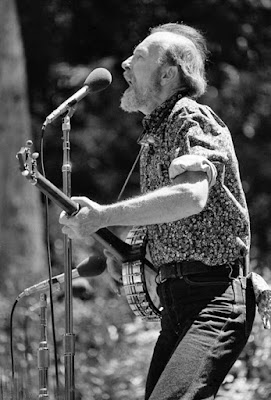 |
| Labor Movement Organizer and Songwriter Jim Connell |
In a column that first appeared in the British Socialist Party's newspaper, The Call, in 1920, a labor movement organizer and songwriter named Jim Connell recalled how he wrote the lyrics to a classic labor song and protest folk song, "The Red Flag" in 1889, when Connell was 37 years old, by writing the following:
"...The song was first published in the Christmas number of Justice [a UK socialist newspaper] 1889, which was then edited by Harry Quelch, and it immediately became popular. Justice then was published on Thursday, and the following Sunday the song was sung in both Liverpool and Glasgow...I may...try to explain how the song came to be written...
"1889 was the year of the London Dock Strike. It was the biggest thing of its kind that occurred up to that date, and its leaders, H.H. Champion, Tom Mann and John Burns, aroused the whole of England by the work they did and the victory they won. Much occurred, however, before that to elevate me.
"Not many years previously the Irish Land League aroused the democracy of all countries. I am proud to be able to say that I founded the first branch of the Land League which was established in England...I remained its secretary until the League was suppressed...
"About the same time the Russian Nihilists, the parents of the Bolsheviks, won the applause of all lovers of liberty and admirers of heroism. Under the rule of the Czar,...the best men and women of Russia were deported to Siberia at the rate of 20,000 a year. Young lady students were taken from their classrooms and sent to work in horrible mines where their teeth fell out and their hair fell off their heads in a few months. Nobody could possibly fight this hellish rule with more undaunted courage than the Nihilists, women as well as men.
"It was my privilege to know Stepniak...His book Underground Russia, produced a greater effect on me than any `revelation' ever produced on a devotee. I was indeed `raised above myself' by the dauntless courage of Vera Sassulitch and the `endless abnegation' of Sophie Perovskaya. There happened also in 1887, the hanging of the Chicago Anarchists. Their innocence was afterwards admitted by the Governor of the State of Illinois. The widow of one of them, Mrs. Parsons, herself more than half a Red Indian, made a lecturing tour of this country soon afterwards. On one occasion, I heard her tell a large audience that, when she contemplated the service rendered to humanity, she was glad her husband had died as he did. Yes, I heard Mrs. Parsons say that. The reader may now understand how the souls of all true Socialists were elevated, and how I got into the mood which enabled me to write `The Red Flag.'
"...In a train between Charing Cross and New Cross, during a 15-minute journey, the first two stanzas, including the chorus, were completed, and I think I may say the whole of the song mapped out. After I got home, I wrote more, and little remained to be done after that. Next day, I made some slight additions and alterations, and the following day I sent it on to Quelch.
"As far as I remember, I never wrote a song in such a short time before or since...Did I, when I wrote it, think that my song would live? Yes. The last line shows I did. `This song shall be our parting hymn.'
"I hesitated a considerable time over the last line. I asked myself whether I was not assuming too much. I reflected, however, that in writing the song I gave expressions to not only my own best thoughts and feelings, but the very best thoughts and feelings of every genuine socialist I knew, Anarchists, of course included. I decided that the last line should stand."
Jim Connell's "The Red Flag" protest folk song lyrics:
(chorus)
"Then raise the scarlet standard high!
Within its shade we'll live and die!
Though cowards flinch and traitors sneer
We'll keep the red flag flying here!"
(verses)
"The people's flag is deepest red;
It shrouded oft' our martyred dead,
And ere their limbs grew stiff and cold
Their hearts' blood dyed its ev'ry fold.
"Look round--the Frenchman loves its blaze;
The sturdy German chants its praise;
In Moscow's vaults its hymns are sung;
Chicago swells its surging throng!
"It waved above our infant might,
When all ahead seemed dark as night;
It witnessed many a deed and vow;--
We must not change its colour now!
"It well recalls the triumphs past;
It gives the hope of peace at last.
The banner bright, the symbol plain
Of human right and human gain.
"It suits today the weak and base,
Whose minds are fixed on pelf and place,
To cringe before the rich man's frown,
And haul the sacred emblem down.
"With heads uncovered swear we all
To bear it onward till we fall!
Come dungeon dark, or gallows grim
This song shall be our parting hymn!"


























